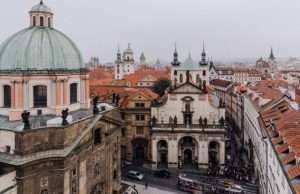Exploring Local Festivals and Traditional Czech Events in and Around Prague
1. Introduction to Czech Culture and Festivals
The Czech Republic, with its rich historical backdrop, hosts a variety of cultural festivals that are deeply intertwined with its heritage. Particularly in Prague, these events offer a glimpse into the traditional customs and festive spirit of the local populace. This article takes you through a yearly journey of local festivals and traditional Czech events in and around Prague, showcasing how these gatherings are a testament to the country’s vibrant cultural landscape.
2. Seasonal Festivals in Prague
2.1. Spring Celebrations
Spring in Prague is marked by the colorful Easter markets and traditions. The Old Town Square and Wenceslas Square are adorned with stalls that offer beautifully decorated Easter eggs, traditional Czech Easter crafts, and delicious pastries. The May Day celebration, another spring highlight, is linked with love and poetry, where locals visit the statue of the romantic poet Karel Hynek Mácha and lay flowers.
2.2. Summer Festivals
As the city basks in sunshine, the Prague Folklore Days bring the streets alive with traditional music and dance, displaying the rich folklore traditions of the region. The Bohemia Jazz Fest, held in the heart of Prague, features world-class musicians and attracts jazz lovers from across the globe.
2.3. Autumn Festivals
The arrival of autumn is celebrated with the St. Wenceslas Market, which pays homage to the patron saint of the Czech lands. It’s a time when the city square buzzes with artisan stalls and musical performances. The International Folklore Festival brightens the chilly days with vibrant dances and folk music from various countries, emphasizing cultural exchange and unity.
2.4. Winter Events
Winter in Prague is truly magical, especially with the traditional Christmas markets that start in late November and last until January. These markets are famed for their festive atmosphere, where you can enjoy Czech Christmas cookies, hot mulled wine, and unique handmade gifts. New Year’s Eve in Prague is celebrated with dazzling fireworks and public gatherings, making it a memorable start to the new year.
5. Traditional Czech Events and Their Origins
The Czech Republic’s festivals are steeped in history, with many dating back to pagan times. These events were not only seasonal markers but also an essential part of the community’s social and spiritual life. Today, they combine ancient traditions with modern festivities, allowing both locals and tourists to immerse themselves in the Czech cultural experience.
6. Local Festivals and Traditional Czech Events
Music and dance play pivotal roles in Czech festivals, with each event featuring traditional folk music and dance performances that have been passed down through generations. The culinary offerings at these festivals are equally important, with a plethora of traditional Czech dishes that tantalize the taste buds and offer a taste of Czech heritage.
7. Unique Events Outside Prague
Moving beyond Prague, the Wine Harvest Festivals in Moravia celebrate the annual grape harvest. These festivals are not only about wine tasting but also include parades, music, and dance, showcasing the local traditions and community spirit. Čarodějnice, or Witches’ Night, is another unique event where bonfires are lit across the country to ward off evil spirits, and people dress up as witches to celebrate the coming of spring.
8. Experiencing Czech Traditions as a Visitor
For tourists, attending these festivals offers a unique opportunity to experience Czech traditions firsthand. It’s advisable to check festival dates in advance and participate in any available workshops or activities to get the full experience. Popular souvenirs include traditional crafts like hand-painted Easter eggs and Bohemian crystal.
9. Impact of Festivals on Local Communities
These festivals not only enrich the cultural life of the community but also bring significant economic benefits. They help preserve the cultural heritage of the Czech Republic while adapting to the changing dynamics of modern society.
10. Modern Adaptations of Traditional Events
In recent years, traditional Czech festivals have embraced modern elements such as digital displays and interactive exhibits, making them more accessible to a global audience. Technology has also played a crucial role in enhancing the visitor experience, providing immersive ways to learn about and participate in these cultural events.
Conclusion
The festivals of Prague and the surrounding regions offer a window into the soul of the Czech Republic, presenting an array of events that are as diverse as they are engaging. Whether you are a local or a tourist, these festivals provide a chance to celebrate Czech culture in its most vibrant form.
FAQs About Local Festivals and Traditional Czech Events
What are the must-visit festivals in Prague for first-time visitors?
For those new to Prague, the Easter markets are a perfect introduction to Czech traditions, featuring colorful crafts and festive foods. The Prague Folklore Days are another must-visit, showcasing traditional Czech music and dance. Lastly, the Christmas markets are an absolute must, immersing visitors in the enchanting atmosphere of a Czech Christmas.
How do local festivals reflect the Czech culture?
Local festivals in the Czech Republic are a vibrant reflection of the nation’s history, traditions, and community spirit. They incorporate ancient customs, folklore, and culinary heritage, showcasing the deep roots of Czech culture in music, dance, and communal celebration.
Are there any festivals suitable for families with children?
Yes, many Czech festivals are family-friendly. The St. Wenceslas Market, for instance, offers activities and entertainment for all ages. The summer Bohemia Jazz Fest features free concerts, making it accessible for families to enjoy music together in a lively, outdoor setting.
What is the best time of year to visit Prague for local festivals?
Each season offers unique festivals, but spring and winter are particularly festive. Spring brings Easter celebrations and May Day, while winter dazzles with its famous Christmas markets and New Year’s Eve festivities. For those interested in music and dance, summer is ideal for attending outdoor concerts and folklore events.
How can visitors participate in traditional Czech events?
Visitors can actively participate by engaging in workshops that teach traditional crafts or cooking classes that focus on Czech cuisine. Attending in traditional attire, or simply enjoying the dances and music, also enhances the participatory experience. Many festivals also encourage visitor involvement in games and customary dances.
These questions and answers aim to help potential visitors better understand and prepare for experiencing traditional Czech festivals, ensuring they make the most of their time in this culturally rich country.










